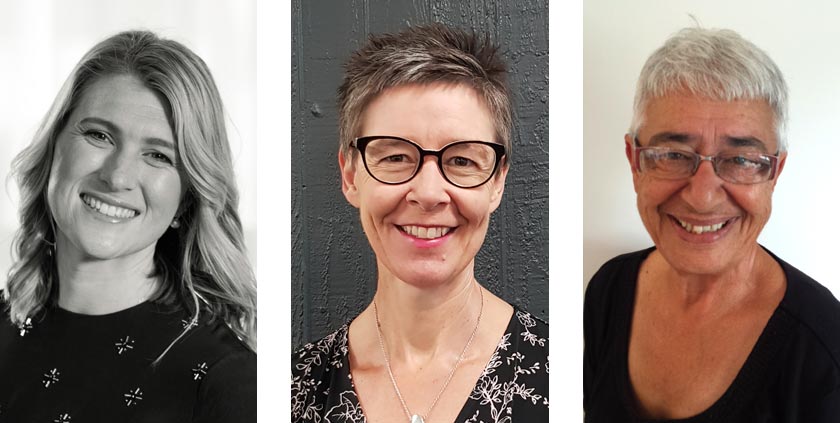Nurse practitioner-turned-doctor Elizabeth Berryman described how witnessing high levels of bullying at medical school and in the health sector led her to develop the “chnnl” app five years ago. The app prompts junior doctors and nurse graduates to share their feelings with employers, anonymously. Berryman described it as a “safe space” between staff and employers, from which reports and trends of wellbeing can be measured.
Health and disability system review panel member Margaret Southwick challenged nurse leaders to come together across sectors to influence health care in Aotearoa. She called on NZNO to facilitate more opportunities for nurses to network, even if in a virtual space.
A highlight of the summit was Royal Melbourne Hospital (RMH) director of nursing Denise Heinjus speaking about Victoria’s COVID-19 experience. There were several parallels with the New Zealand experience in aged residential care (ARC), which suggested our approach of “going hard and going early” with lockdown may have been highly effective in limiting COVID-19’s spread.
No room for complacency
However, Melbourne’s experiences remind us we cannot afford to be complacent. The second wave has had a serious impact in Victoria, especially in ARC facilities and in high-density and socially and economically disadvantaged areas. A video performance of Bruno Mars’ You can count on me by the RMH Scrub Choir brought many to tears.
MidCentral District Health Board (DHB) clinical project manager Denise White spoke about the Mahi-Tahi programme, which aimed to improve patient care through greater whānau engagement and support.
MidCentral DHB had changed its visiting hours and signage and provided free parking, meals and sleep facilities to encourage whānau support for patients. Whānau had the right – not duty, which remained with the nurse – to be involved in patients’ personal care, should they wish. Whānau were acknowledged as different to “visitors” as being an integral part of the patient’s life, White said. A patient determined their own whānau, which was not limited to biological relatives.
White said encouraging whānau support was a cost-effective way to improve patient outcomes, as the comfort and emotional support aided recovery.
Nursing Council legal adviser Nick Davies discussed the case of the Taranaki nurse whose registration was cancelled in an interim decision by the Health Practitioners Disciplinary Tribunal (HPDT) in late July, over racist comments she made on a Facebook page last May. His message was about the importance of zero tolerance for racism. There is clearly an opportunity for NZNO to provide further education in this space.
Jill Clendon, Nelson Marlborough District Health Board’s associate director of nursing and an adjunct professor at Victoria University of Wellington, talked about unconscious and systemic bias – how to recognise and overcome both, for better patient outcomes.
Systemic biases were barriers maintained by institutions, while unconscious biases were upheld by individuals. But both resulted in inequities, she said.
Unconscious bias was an automatic way of thinking about those who differed from ourselves, and could hinder objective decision-making, she said. Strategies such as analysing the biased thought before speaking – a “self-check” – and getting to know a range of different people to avoid perpetuating biased behaviour, could address people’s bias. Systemic bias persisted today due to unconscious bias, Clendon said.
Māori reported high levels of discrimination within the health system; and women were more likely to be assessed as stressed or anxious than unwell – even if they had a cardiac condition.
Clendon challenged nurses to consider how to mitigate the impact of unconscious bias in the workplace and in health outcomes.
University of Auckland senior nursing lecturer Sue Adams suggested the medical model of primary health care (PHC) was no longer fit for purpose. Smaller GP practices were being subsumed into larger entities, often with a focus on profit, and nurses were well-placed to lead change and provide holistic health services.
PHC nurses ‘make a difference’
Nurses in PHC also had a “fabulous opportunity” to make a difference to health inequities, by meeting the community’s need with nurse-led multi-disciplinary teams which promoted well-being. “Nurse-led clinics and advanced practice is a very real option to achieve true universal health coverage”. Adams also urged nurses to be more politically active, to influence change.
Institute of Strategic Leadership chief executive John Wadsworth spoke about the importance of leadership in an uncertain world. He suggested leaders should show compassion, to build trust with staff. But leaders needed to prioritise their own well-being, to be able to support others. Protecting down-time and role-modelling this to staff gave them permission to do the same.



